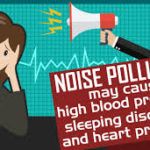Noise Pollution May Impact Heart Health, According to New Research
 Research shows noise pollution can negatively impact your health. Noice triggers our fight or flight response, releasing the stress hormone into our body.
Research shows noise pollution can negatively impact your health. Noice triggers our fight or flight response, releasing the stress hormone into our body.
One way to help decrease the negative affects is by doing yoga to calm and sooth your mind and body. Yoga combines breathing and meditation, and adds an element of exercise to be a stress reliever that acts on several different levels to benefit your health )
To learn more about noise pollution, listen CBC Radio’s Dr Peter Lin, MD Feb 8, 2018 Early edition and Feb 6, 2018 Fortune article.
Noise Pollution May Impact Heart Health, According to New Research
Noise—especially during sleep—may have a negative impact on cardiovascular health, according to a new study.
A paper published this week by German and Danish researchers in the Journal of the American College of Cardiology examines noise pollution as a risk factor for heart disease, including coronary artery disease, hypertension, and heart failure. While noise is not a direct causation for these diseases, it may be a risk factor, the same way that obesity and high blood pressure increase risk, according to the study’s lead author, Dr. Thomas Münzel, from the University Medical Center Mainz Center of Cardiology in Germany.
“What we know is that if you already have pre-existing risk factors for heart disease, such as high blood pressure or diabetes, noise will amplify that risk,” Münzel told ABC News.
Münzel, along with authors Frank P. Schmidt, Sebastian Steven, Johannes Herzog, Andreas Daiber and Mette Sørensen, reviewed data from previous studies to look at the link between noise and heart disease.
Along with disrupting sleep, which can negatively impact health, loud noises can trigger stress hormones that over time can hurt the heart.
The Washington Post points out that it’s difficult to isolate noise as a factor. People who are exposed to noise pollution may also be exposed to other heart disease risks such as an unhealthy diet or air pollution.
However, the World Health Organization does note that noise is an “underestimated threat that can cause a number of short- and long-term health problems, such as for example sleep disturbance, cardiovascular effects, poorer work and school performance, hearing impairment, etc.” It has a list of recommended maximum decibels for activities like sleep (30 decibels) and learning (35 decibels).
In terms of combatting this issue, Münzel recommends government action, telling ABC News, “We need our governments to pay attention to the WHO noise limits and change the laws accordingly.”
Recent Posts
- Setting Positive Intentions Inspired by Yogic Wisdom
- 10 Steps: How to Navigate Stormy Seas – Guiding principles to help you land onto safer shores
- Celebrating Global Yoga Therapy Day – A Journey of Healing and Empowerment
- Chair Yoga for Healthy Aging: Promoting Independence, Well-Being, and Mental Clarity
- Sleep Solutions: Empowering Restful Nights for Older Adults, Concussion Recovery, Back Pain, and Mental Health

